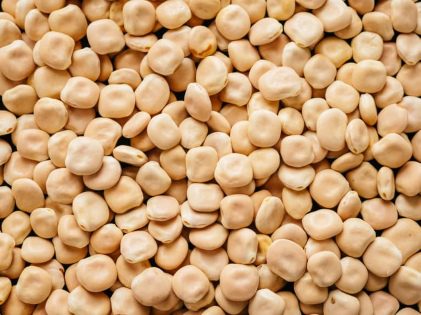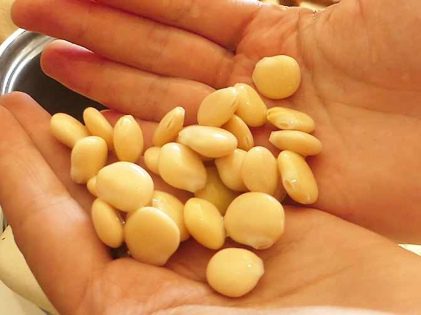The small beans you find at supermarkets, grocery stores, and local shops are what we commonly call lupin beans or lupini. Ideally, Mediterranean region classics, these beans belong to the same food family-like lentils and chickpeas and taste quite similar to soybeans. After their nutritional benefits became public knowledge, lupin beans are taking the world by storm (especially after 2020).
A serving of lupin contains almost double the protein of chickpeas, and the fiber content is greater. It might surprise you to know that oats and quinoa fail before lupins! Thanks to the nutrient-rich food, the US embraced this new food, which eventually led lupine beans to become a “trending ingredient” across the world, especially among wellness experts. Here are potent reasons why you must invest in them.
Sustainable Protein Source
 Americans are always looking for sources to increase their protein intake. And lupins have emerged as the new savior. There are new-launched lines of protein bites that have made news already. Check for the prime ingredients, and you will know why lupins score big. Lupin beans are great as rotational crops and are famous for their sustainability.
Americans are always looking for sources to increase their protein intake. And lupins have emerged as the new savior. There are new-launched lines of protein bites that have made news already. Check for the prime ingredients, and you will know why lupins score big. Lupin beans are great as rotational crops and are famous for their sustainability.
Lupin beans successfully were entrants in the market after discovering how they revitalized Australia’s wheat farms (a leading supplier now). Besides the great taste, lupin beans also fulfill the requirements for plant-based proteins.
Promotes Gut Health
Thanks to the high fiber content, lupin beans come as a welcome relief. Several registered dieticians and food experts have also added how it’s next to impossible to find such an amazing, dense protein source and a pro-biotic soluble fiber containing add-on fibrous carbohydrates containing very little sugars and starch, as lupins. Fiber is the leading cause for making lupine beans a staple in branded cookies too.
Alternative To Quinoa

Research suggests that you can give quinoa a miss if you consume lupins. Consuming these is equivalent to that of a good serving of couscous or quinoa. Mostly, these beans have a very neutral taste and can take on any spice required. The taste is enhanced if the diet is simple, adding just a dash of lemon juice and garlic. As a result, it’s quite versatile, and people can eat lupins in much the same way as rice or quinoa.
They are low-carbohydrates, which makes them a part of the favorite keto! No lentil or chickpeas has managed to attain that yet. Experts often said how lupin beans are those foods that can change the entire concept and category of food we often thought. The ways to cook, using or prepare are limitless.
Laden With Nutrients
Lupins contain no less than three times more plant proteins than quinoa. It also has three times more fiber than oats, three times more antioxidants than berries, three times more potassium than bananas, and three times more iron than kale. Many people often love the idea of having lupins as a whole-bean snack, while some prefer using salt lupins or pickles. You can try milling it into flour to make cakes, pasta, bread, and biscuits.
Lupin flour, for example, contains more protein and fiber content and minimizes carbohydrate content in baked foods. You can also try adding the same to smoothies, stews, and soups to thicken the consistency. They are usually gluten-free, but it’s best to avoid lupin if someone is allergic to peanuts or soy since the proteins are similar.
Supports The Cardiovascular System
 The dietary fiber content in lupin is 4.6 grams per 100 grams, which is about 17% of the total and daily recommended value. This lowers down chances of strokes and heart attacks. Besides, the magnesium and potassium content is also high. While magnesium relaxes blood vessels, potassium ensures perfect water balance. The antioxidants, too, help improve the cardiovascular system.
The dietary fiber content in lupin is 4.6 grams per 100 grams, which is about 17% of the total and daily recommended value. This lowers down chances of strokes and heart attacks. Besides, the magnesium and potassium content is also high. While magnesium relaxes blood vessels, potassium ensures perfect water balance. The antioxidants, too, help improve the cardiovascular system.
Helps In Weight Management
Sounds great? Since it’s just second to soy in protein content, lupins can suppress the appetite well. One hundred grams of beans make 40 grams of carbs, and thus the energy content is built. While eating these beans, the feeling of being full is so much that one can lessen the consumption of other foods likewise, sans feeling exhausted.
If you haven’t included lupins in your diet yet, it’s time you do. However, before you do so, make sure you talk to your dietician to understand more about the right quantity of lupin for your body.
